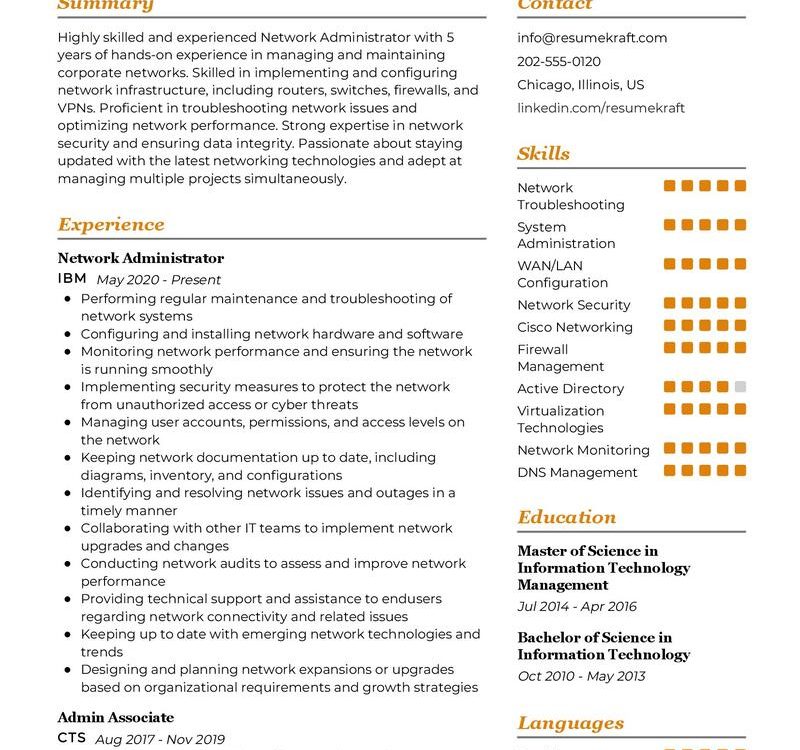Understanding the Role of a Network Administrator
In today’s digital age, the role of a Network Administrator holds significant importance in organizations worldwide. Network Administrators are the backbone of an organization’s IT infrastructure, responsible for ensuring that the network runs smoothly, securely, and efficiently. Let’s explore the multifaceted role of a Network Administrator, a position that demands technical expertise, problem-solving skills, and the ability to adapt to evolving technologies.
Key Responsibilities of a Network Administrator
A Network Administrator’s responsibilities encompass various aspects of network management and maintenance. Here are some core responsibilities that define the role:
- Designing, implementing, and maintaining network infrastructure to ensure optimal performance and reliability.
- Monitoring network performance and identifying potential issues or bottlenecks to prevent downtime and ensure seamless operation.
- Configuring and troubleshooting network devices such as routers, switches, firewalls, and wireless access points to maintain connectivity and security.
- Implementing and managing network security measures to protect against unauthorized access, viruses, and other cyber threats.
- Managing user accounts, permissions, and access controls to ensure data confidentiality and integrity.
- Collaborating with other IT teams to integrate network infrastructure with other systems and applications.
- Providing technical support and guidance to end-users to resolve network-related issues and optimize usage.
- Documenting network configurations, procedures, and troubleshooting steps for reference and training purposes.
These responsibilities require a combination of technical expertise, analytical skills, and effective communication to effectively manage and optimize the network infrastructure.
Qualifications and Skills Required
Becoming a successful Network Administrator requires a blend of education, certifications, and practical experience. Here are some key qualifications and skills typically required for this role:
- A Bachelor’s degree in Computer Science, Information Technology, or a related field, providing a solid foundation in networking principles and technologies.
- Certifications such as CompTIA Network+, Cisco CCNA, or equivalent, demonstrating proficiency in networking concepts and technologies.
- Hands-on experience with network equipment and tools, including routers, switches, firewalls, network monitoring software, and troubleshooting utilities.
- Strong knowledge of TCP/IP protocols, subnetting, VLANs, routing protocols, and network security principles.
- Problem-solving skills and attention to detail to diagnose and resolve network issues effectively.
- Excellent communication and interpersonal skills to interact with colleagues, clients, and vendors effectively.
- Ability to work well under pressure and prioritize tasks in a fast-paced environment.
Continuously updating skills and staying abreast of emerging technologies and industry trends is essential for success in this dynamic field.
Building Your Network Administrator Resume
When crafting your Network Administrator resume, it’s essential to highlight your qualifications, skills, and relevant experience effectively. Here are some tips to create a compelling resume:
- Start with a strong summary that highlights your expertise, experience, and key achievements in network administration.
- Include relevant certifications and technical skills prominently to demonstrate your qualifications.
- Showcase your experience with specific projects, accomplishments, and contributions to previous employers.
- Quantify your achievements where possible, such as reducing network downtime, improving network performance, or implementing cost-saving measures.
- Highlight your problem-solving abilities and your proactive approach to network management and security.
- Tailor your resume to the job description, emphasizing skills and experiences that align with the employer’s requirements.
A well-crafted resume can help you stand out as a qualified candidate for Network Administrator positions.
Conclusion
Being a Network Administrator is a challenging yet rewarding role that plays a crucial part in ensuring the smooth operation of an organization’s IT infrastructure. By effectively managing network resources, implementing security measures, and providing technical support, Network Administrators contribute to the overall success and efficiency of the business.
Remember, to craft a standout resume that highlights your qualifications and experiences effectively. Utilize resources like AI Resume Builder, Resume Design, Resume Samples, Resume Examples, Resume Skills, Resume Help, Resume Synonyms, and Job Responsibilities to enhance your application and prepare for Network Administrator job interviews.


